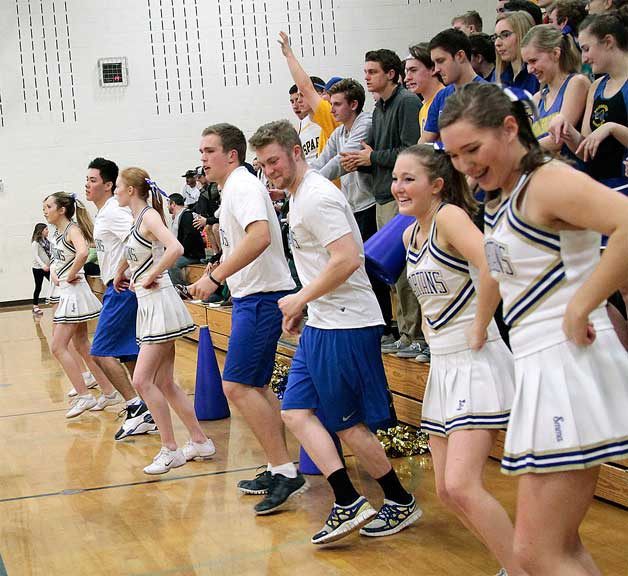Give me a B!
Give me a O!
Give me a Y!
BOY it’s cool to see guys on the cheer squad, finally.
Why is it that a girl who seeks out “boy” sports is admired and even heralded for breaking through social barriers, while guys attempting the reverse, especially male cheerleaders, are often dismissed — or even mocked?
Bainbridge High School has been the ground for just such social discussion and exploration this past sports season, with athletes of both genders breaking new social ground in Metro League competitions around the region.
On the varsity wrestling team, BHS senior Jordan Jackson became the first female Spartan grappler in memory, and a small group of dedicated guys set about leaving their mark on the cheer squad.
“At BHS males have been on the squad before for performances only,” explained varsity cheer squad Head Coach Tawnya Jackson. “This is the first time that they have actually cheered at football and basketball games.”
This year’s barrier-breaking boosters include Gareth Grindeland, Duncan McCombs, Jack O’Neil and Max Thomas.
Grindeland said recently that all of the guys remembered the senior male cheerleaders who were on the squad back when they were just freshman, and that he and the others wanted to keep the tradition going.
“The last [male] cheerleaders were seniors when we were freshman, but they weren’t as involved as we are right now,” he explained. “I remember talking to my friends about it and saying, ‘When we’re seniors we got to do that!’”
“It looked like a lot of fun,” he added.
Jackson, a former Seahawks cheerleader herself, explained that historically cheerleading was actually quite a boys club for a long time. In fact, according to cheerleading.org, women weren’t even allowed into the sport at all until the late 1920s.
“What started out as an all-male sport is now moving back towards its roots, well, sort of,” she said. “Since the 1920s women have dominated cheerleading, and over the years it became associated with femininity. But now that cheerleading incorporates tumbling, stunting and acrobatics, its reputation as a wimpy pastime is long gone.”
“It is finally being recognized as a legitimate sport,” she added.
Legitimate, and difficult.
Jackson is quick to admit that although the squad’s routines may seem fun and easy, that’s just the performance aspect of what is actually a very physical show.
“Being a male cheerleader is not easy,” she said. “In fact, you must be extremely strong, flexible and resilient. It can be helpful if you are already active in other sports before you start cheerleading, so you recognize the dedication and work ethic required to be on a team.”
Grindeland said he was actually surprised to learn how difficult cheerleading was.
“When we first got to cheer camp this summer … my first thought was, ‘Wow, this is way more intense than I thought,’” he remembered.
Nearly all of this season’s male cheerleaders have been active participants in other sports during previous seasons, and they are familiar with the requirements of teamwork and competition.
Cheerleading, however, Jackson insisted, requires a different mindset.
“Male cheerleaders must be team players,” she said. “You are never truly performing on your own, and there are no personal victories in team cheering.”
O’Neil, another male newbie, said that any teasing directed at the guys on the squad this year was minimal and all in good fun, mostly from former teammates in other sports.
“I guess my friends gave me some crap sometimes, but from everyone else — everyone was really supportive,” he said. “I was actually kind of surprised. They really supported us and what we were doing.”
“We were happy to be out there and supporting the team,” he added.
Even if it might be a while before cheerleading becomes thought of as a truly coed sport in the minds of most, Jackson said that for those guys who are willing to give it an honest try and work hard, the sport has a lot to offer, including numerous scholarships, potential national recognition and travel opportunities and a uniquely inclusive sense of camaraderie.
“Coed cheer teams have a bond that most sports aren’t lucky enough to experience because of gender separation,” she explained. “The inclusiveness of these teams makes for an experience unlike anything else in sports.”
“Although you may have to fight off some stereotypes, being a male cheerleader definitely has its advantages,” Jackson added.
Everyone on the squad agrees that the team benefits from the presence of both genders, though Jackson is quick to admit that it may take some time to reverse the notion that cheerleading is just for girls.
“Most importantly, to be a male cheerleader, you also have to have an open mind and be willing to try new things,” she said. “Most boys grow up knowing about sports like baseball and football, but cheerleading is usually foreign territory. If you join a cheer squad, you have to learn all of the stunts and tumbling that go along with the sport.”
The experience has been a rewarding one, O’Neil and Grindeland agreed, and one that they would recommend.
“It’s a real team,” O’Neil said. “When we went to cheer camp over the summer, we were all shocked. Like, it was ridiculous because everyone gave it their all and everyone was putting so much blood, sweat and tears into the sport and I was just amazed. It’s just an amazing experience to go out there and have fun.”
“Don’t take people for granted,” O’Neil added. “Don’t judge people about what they do or who they are. If you want to do cheerleading, or whatever, no matter what kind of sport – no matter what thing you’re doing – don’t let anyone stop you.”


